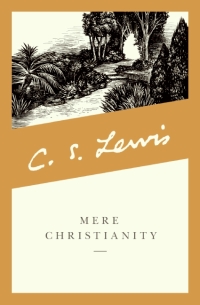 Kim Gentes |
Kim Gentes |  1 Comment |
1 Comment | In the past, I would post only book reviews pertinent to worship, music in the local church, or general Christian leadership and discipleship. Recently, I've been studying many more general topics as well, such as history, economics and scientific thought, some of which end up as reviews here as well.
 Friday, February 22, 2013 at 2:25PM
Friday, February 22, 2013 at 2:25PM  There are few Christian writers that have had as deep and ongoing impact in the last century as C.S. Lewis. One of his most celebrated books has been "Mere Christianity". Originally written in 1944 from the texts of various radio broadcasts, Lewis compiled and revised this collection of thoughts into his seminal work that preserves both his legacy as a great thinker and his profound skill as a writer.
There are few Christian writers that have had as deep and ongoing impact in the last century as C.S. Lewis. One of his most celebrated books has been "Mere Christianity". Originally written in 1944 from the texts of various radio broadcasts, Lewis compiled and revised this collection of thoughts into his seminal work that preserves both his legacy as a great thinker and his profound skill as a writer.
While I had originally read this book in the mid-eighties, I knew it was time to revisit it. So, the last couple of weeks I re-read this classic Christian book a couple of times. In fact, reading it once actually was somewhat painful. I kept scouring the book and furrowing my brow as Lewis would make his knife sharp points at the end of each chapter. By the time I had completed one pass through the book, I knew immediately I must run through it again. The insights, and even more, the narrative flow are sparkling examples of great writing, from a master of language.
The more I read Lewis, the more it occurs to me that he is first and foremost, a writer. A brilliant writer, to be sure, but that primarily. In fact, Lewis makes this point in this book and tries to derail people who try to come at this book as theological treatise. This didn't strike me at first as being important, but the more I talk to others about this book, the more I realize it is true. I often hear others talk about "Mere Christianity" as though it were a theological defense. It is not. That isn't to say it is bad theology; rather that it isn't really written as a theological book (one in which Biblical texts are used as the centerpoint of building a case for a Christian perspective).
In one sense it is a Christian apologetic, but it doesn't come from the perspective of arguing Christian points against alternative religions or even atheistic ones. Instead, Lewis approaches the concepts much more broadly, dealing with the (universe, humanity and reality) and eventually narrows his scope to point at which the "big questions" of life are asked. Into that stream of thought, the author presents his thesis that the Christian God is not only the Creator but the ultimate Father of our eternal souls. But Lewis goes there in very deliberate, progressive steps, making sure to explore the thought process and objections of people who might be learning of the Christian faith.
Along that path, from investigation to discovery to comprehension to obedience (and all along the way, transformation), Lewis plants some of the most succinct and powerful phrases about the nature of man, the Creator and the universe we live in. For example:
In reality, moral rules are directions for running the human machine. Every moral rule is there to prevent a breakdown, or a strain, or a friction, in the running of that machine.1
Do not waste time bothering whether you ‘love’ your neighbour; act as if you did. As soon as we do this we find one of the great secrets. When you are behaving as if you loved someone, you will presently come to love him.2
There are literally dozens of quotable passages in this book- and pastors and authors have been quoting them for decades. In some ways, this book contains an expanded version of some of the core facts that Lewis writes in his famous sermon "The Weight of Glory"- but here he expands and draws a usable entrance way to non-believers to understand the Christian claims and follow and intelligent discourse about it. To be sure "Mere Christianity" is more meat than the sermon as well, and Lewis uses that storyboard to gradually move a reader from an unintelligent and lost world into a comprehension of the plan and love of God through His Son, Jesus Christ.
Lewis travels the distance from talking about a grand Cosmic Mind who is not only the author of the moral code, and behind the extance of all things, but who becomes the personal 3-in-One God who stands beside us (in Jesus), acts from within us (in the Holy Spirit), and opens grand arms to recieve us (in Father God) all as part of his program of love to draw man out of his death-ridden self into the life of being "sons of God".
The author does a spectacular job of answering the questions we all wonder about, but don't or can't find our way through the philosophical jungle of competing or amoral reasoning to find the truths we seek. With Lewis as our guide on this philosophical journey, we are in good hands, indeed. His mind, his writing and his raw humanity ask the tough questions and graciously walks us through both false and proper narratives to funding the likewise conclusions. It would be silly to say this book is a classic- everyone already acknowledges that. And yet it is that. It belongs alongside the best writings in Christian history.
Amazon Book Link: http://amzn.to/X0aUE3
Review by Kim Gentes
 Kim Gentes |
Kim Gentes |  1 Comment |
1 Comment |  Friday, October 28, 2011 at 7:39PM
Friday, October 28, 2011 at 7:39PM  Pensées is a collection of thoughts, from French mathematician and philosopher Blaise Pascal. In many ways Pascal was an early post-modernist thinker, perceiving and challenging (successfully) not only principles in mathematics and physical sciences, but in the philosophical and religious realms as well. The Pensées (which literally means “thoughts”) is not a completed book, but a point-style outline of important thoughts, that read more like proverbs than treatise. The work was published posthumously and is missing a readable flow from thought to thought.
Pensées is a collection of thoughts, from French mathematician and philosopher Blaise Pascal. In many ways Pascal was an early post-modernist thinker, perceiving and challenging (successfully) not only principles in mathematics and physical sciences, but in the philosophical and religious realms as well. The Pensées (which literally means “thoughts”) is not a completed book, but a point-style outline of important thoughts, that read more like proverbs than treatise. The work was published posthumously and is missing a readable flow from thought to thought.
However, the concepts presented in Pensées are quite clear- they are a philosophical apologetic for the Christian faith. In Section III of the work (titled “the necessity of the wager”) Pascal clarifies his intention to speak directly to a specific group of people:
A letter to incite to the search after God. And then to make people seek Him among the philosophers, sceptics, and dogmatists, who disquiet him who inquires of them.[1]
From this point, Pascal lays out a logical progression of deconstructing arguments against Christianity. However, Pascal is not saying that logic or reason as the answers to finding God. In fact, his premise is that reason will not be able to lead you through its processes to knowledge of God. He uses philosophy and reason to counter the notion that reason is a singular tool to concluding God exists- this dichotomoy is not lost on Pascal and he tries to reconcile this by such paradoxical renderings as :
Submission.--We must know where to doubt, where to feel certain, where to submit. He who does not do so, understands not the force of reason.[2]
and
If we submit everything to reason, our religion will have no mysterious and supernatural element. If we offend the principles of reason, our religion will be absurd and ridiculous.[3]
In the midst of his musing about reason and heart (the contrast of the two), Pascal famously pens the phrase “The heart has its reasons, which reason does not know.”[4] But he winds that discussion eventually around to a simple, clear and understandable summation: “Heart, instinct, principles.”[5]
He tackles a number of topics including integrity of searching for God to the seriousness of eternity and the scope of human lifespan. At almost every turn, Pascal uses the insights of a scientific mindset (along with its proofing mechanisms) to first examine a topic and then lead you to a conclusion. This progression is sprinkled generously with several “proverb-like” sentences in which he levels basic human truths in seeming juxtaposition to the more straightforward point-building scheme of proofing his opinions. Occasionally, he also uses a dialogical counterplay of asking us to imagine things about one position and then asking questions about himself, all the while inferring an obvious point toward the validation of the Christian position as a logical premise.
But it is the punctual proverbs that surprise most readers, for example:
Instability- it is a horrible thing to feel all that we possess slipping away. 213 Between us and heaven or hell there is only life, which is the frailest thing in the world.[6]
One of the most well known portions of Pensées is an argument that is popularly called “Pascal’s Wager”. This proposal is basically a logical explanation for why it would be unreasonable to not believe in God. Through using his wager, he hopes that intellectual people will consider believing in God to be a proper “wager” to take.
In a summary of proofs on believing in God the author gives yet another dailogical possibility:
Two kinds of persons know Him: those who have a humble heart, and who love lowliness, whatever kind of intellect they may have, high or low; and those who have sufficient understanding to see the truth, whatever opposition they may have to it.[7]
Pascal comes to this point, saying that people may come to God through the mind or the heart, and both are acceptable and not to be shunned.
Amazon Product Link: http://amzn.to/rFEhfy
Review by Kim Gentes
[1]Blaise Pascal, “Pascal's Pensées ”, (Public Domain Books, Kindle Edition), Pg. 53
[2]Ibid., Pg. 78
[3]Ibid., Pg. 79
[4]Ibid., Pg. 80
[5]Ibid., Pg. 81
[6]Ibid., Pg. 63
[7]Ibid., Pg. 83